Idaho City
(Part 4) First Fire May 18, 1865
Boise County, Idaho
1883 Map Boise County (Boise Basin)
Idaho City Fires
Idaho City had four disastrous fires during the 1860’s and early 1870’s. Despite the loss from these fires, many of the city’s brick buildings survived and are actively preserved today.
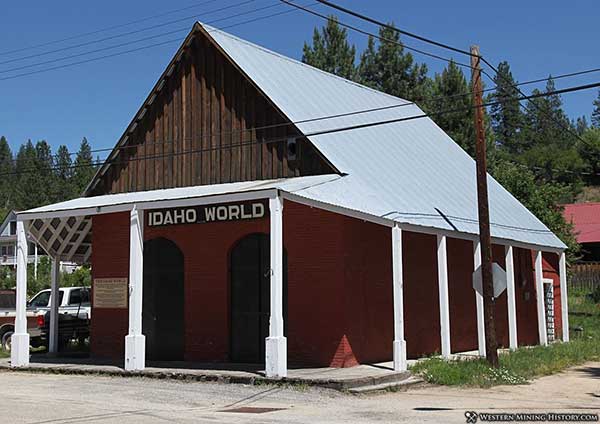 2018 Idaho World is Idaho’s Longest Operating Newspaper
2018 Idaho World is Idaho’s Longest Operating Newspaper
In 1863 the “Boise News” (later called “Idaho World”) was established in Idaho City and is Idaho’s longest running newspaper.
from: Western Mining History
— — — — — — — — — —
Idaho City
The height of the boom lasted from 1863 to 1866. By 1867 many sold out to Chinese miners who were able, through industrious work, to make the mines pay; the 1870 Census lists 1700 Chinese. The rich gold fields were considered “panned out” as most readily worked streams had been worked. Another major factor in the decline was the high loss caused by destructive fires. Fires hit Idaho City in 1865, 1867, 1868 and 1871.
excerpted from: Boise County
— — — — — — — — — —
Idaho City’s Burning Habit
by Rick Just, Speaking of Idaho
Idaho city had a habit of burning. This wasn’t unusual for mining towns. They were initially mainly built of lumber without a thought given to brick. When a mining settlement sprang up, its builders knew there was a very good chance it would be a temporary town.
The buildings of Idaho City were heated by stoves and fireplaces and lit by candles and lanterns. All those open flames were ready to snatch a dry curtain or a splash of grease from a frying pan. Everyone who lived there did their best to keep the smoke contained. Still, fires from heating and cooking were quietly coating the insides of cabins and commercial buildings with creosote, making them even more explosive.
On the 18th of May, 1865, residents of Boise noticed a glow from the northeast one evening. Speculation was that it was either Idaho City or Placerville burning. Early the following day, word started coming from businessmen arriving in Boise that it was Idaho City in ashes.
A few minutes before ten in the evening, the alarm spread that a fire had started on the second floor of a hurdy-gurdy dance hall and leaped to the rear of the City Hotel.
“The flames spread with the most astonishing rapidity,” according to the Idaho Statesman. “The town was composed of buildings made exclusively of pine inch boards, and in some cases shakes, covered with cotton lining and paper, to which was added the usual coating of lamp smoke so that it burned almost like a train of powder.”
The mining town had experienced a rash of small fires preceding the big blaze. This was viewed with suspicion since “As soon as the alarm became general, thousands of men could be seen running in all directions with one or two sacks of flour, a box of candles, a bundle of clothing, or anything that suited them.”
A witness remarked that “it was stealing on the grandest scale ever he dreamed of.”
The thieves were loosely organized. One or two hundred of them would gather store contents in a pile away from the burning town, appearing to help the merchants. Then, on a signal, they grabbed whatever they could and lit out.
Every hotel in the city was destroyed, along with most of the stores. Some merchants had fireproof cellars so they could quickly get back to business. By the next day, vendors were clearing away rubble so that a new town could spring up from the ashes.
excerpted from: Speaking of Idaho
— — — — — — — — — —
Gold Camps and Silver Cities
[…] Then on May 18 [1865] a fire broke out in Idaho City, the first in a series of four such disasters, and destroyed over a million dollars in property. Although the best production had been realized by that time, the basin placers were by no means worked out. The town was rebuilt promptly, but a great oversupply of goods had been rushed in by merchants wishing to capitalize on the shortages created by the fire. When the customers failed to materialize, many had to sell at a loss. The miners may have benefited by the fire, however, both in lower prices and in a chance to placer out much more of the burned-over area of Idaho City.
Excerpted from: “Gold Camps & Silver Cities” by Merle W. Wells, 1983
— — — — — — — — — —
First Idaho City Fire
On the night of May 18, 1865, disaster struck Idaho City. A fire erupted about 9:00 p.m. near the center of town, believed to have started in the upper story of a dance hall. Since all of the buildings were made of pine, the fire moved swiftly. Miners from all over the Basin came running into town when they saw the sky lighted by the fire. Looters took what they could carry from stores before they were engulfed in flames. The fire lasted about three hours destroying most of the businesses and better residence parts of the town. Many men who had been considered wealthy were left penniless though some merchants who had underground cellars were able to salvage a few items.
Of the public buildings, only the Catholic Church, the Jenny Lind Theater, the office of the Idaho World, and the I.O.O.F. Hall remained standing. The homeless were housed in homes that escaped the flames and the Catholic Church was converted into a hospital. The loss was estimated at $900,000. An indictment of arson was found against one man, but the matter was later dropped.
The townspeople immediately began rebuilding and a few weeks later business activities were being carried on as before.
excerpted from Legends of America, © Kathy Weiser-Alexander
— — — — — — — — — —
Newspaper Clippings
Boise News., September 29, 1863, Page 3
“Iron Clad”
This is the name we hear applied to the immense cellars – or “Root-houses,” as they are termed in Oregon – in the rear of nearly all the stores and business houses in Bannock. They are constructed by digging a large, square pit in the ground, and covering it was timber in the shape of a house roof, after which earth is heaped upon it until it is considered fire-proof. In these are kept all the goods that are not wanted for immediate use in store. An excellent precaution we think, as it is not all probable we shall escape the common fate of all mining towns that have preceded us on this coast with regard to fire.
source: Boise News. (Bannock City, I.T. [Idaho City, Idaho]), 29 Sept. 1863.
Chronicling America: Historic American Newspapers. Lib. of Congress.
— — — — — — — — — —
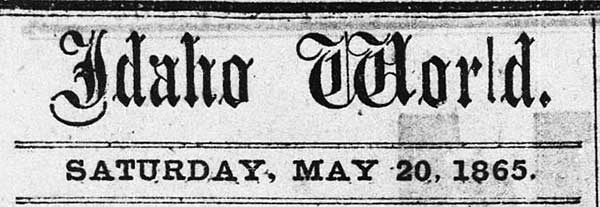
The Idaho World. May 20, 1865, Page 2
 The Conflagration
The Conflagration
Idaho City In Ashes!
Idaho City has been visited by one of those great disasters which occasionally fall upon communities with crushing, deadening weight. A great fire on Thursday night laid nearly the entire town in ashes, sweeping away the fortunes of very many of its business men, and leaving innumerable families homeless and destitute. The entire business portion of the town was completely destroyed. A narrow, scattered remnant of buildings on the outskirts of the town alone remain to mark the boundaries of Idaho City.
The fire was first discovered about ten o’clock in the evening breaking out in massive sheets of flame from the roof of a dance house on Montgomery street. Persons who saw the fire when it first appeared on the roof, assert that but a moment elapsed before the whole upper portion of the building was enveloped in flames. The wind at this time was blowing from the south. In a few minutes the adjoining buildings, including the Sheriff’s and probate Judge’s office, Wells Fargo & Co.’s Express Office, the Idaho Saloon, kept by Cunningham and Lawrence, and Totman’s saloon was also on fire. By this time the alarm of fire brought together nearly every one in town, and a strong effort was made to check the further progress of the fire, but without any avail whatever. It swept furiously up the range of buildings on Main and Montgomery streets, carrying every building before it. Taylor’s Exchange, the City Hotel, Magnolia Hall, Harris’s drugstore, the Umatilla Market, followed in rapid succession. At this time the wind was blowing strongly up the creek, and it was the general opinion that the lower portion of the town would escape, but as the flames swept through some of the two-story buildings, they seemed to gather strength and an unquenchable ferocity. The east side of Main street was next on fire. Mix’s drugstore, Robertson & Co.’s Jewelry store, Charlton & Langworthy’s brokers’ office, Fred Bell’s saloon, Lauren’s saloon, and other’s [sic] on the east side, and on the west side the Washoe saloon, Prior’s saloon, Peff’s bakery, Gans & Bro.’s bowling saloon, and others were all on fire together. Every building on Main street was destroyed up to and including the old American hotel.
The wind, meanwhile, continued to increase, blowing in puffs from every point of the compass. lurid gleams of lightning shown out from the black lowering bank of clouds in the south, while over the doomed town the flames crackled and roared with fiendish exultation. The Forrest Theater, opened for the second night only, and which at the beginning of the fire was crowded with a careless and happy audience of ladies and gentlemen to witness the Potter troupe in Shakespeare’s “Romeo and Juliet” – was soon floating in flaming brands through the sky.
The wind at this time changed its course and commenced blowing from the north and north-west. The conflagration having destroyed nearly the whole of the upper end of town, now seemed to part and turn in two fiery circles, to the right and left. Turning to the right from Rossl & Robie’s office, and the American Hotel, it came furiously down High street. Here a great many new buildings had been recently put up for residences of families. Those soon disappeared – but few of the owners saving anything of much value. The left wing of the fire turned down the west side of Montgomery and extending thence westerly across the lower end of Wall street to Commercial. At this stage, the whole town presented a fearful sight. The forked tongues of fire seemed to lick the very clouds; dense volumes of black smoke rolled in streams down the Basin; the whole city from bank to bank was a sea of boiling flames, sweeping with the gale in a fiery wave to the southward. As it rolled down towards the lower rend of town, it broadened out on each side, climbing up on East Hill as high as the residences of Mr. Charlton and Col. Hall, destroying the old Sheriff’s office, office of the District Clerk, Higby & Co.’s store, International hotel, Pickwich Hall, Claressy’s saloon, Smith & Stern’s store, and every building on both sides of Main and High streets as far south as the south side of Wallula. The Catholic Church was saved by extraordinary efforts – One hundred men, we are told, were on the roof at one time. Every building on Commercial street, as far east as the church, was burned. On the western side of the town, nothing was left except McGrerty’s building, near the foot of Wall street, and Ben. F. Wood’s store. On Montgomery street, everything is gone down to the corner of Commercial. The block including Mr. Gaby’s house and Dryde’s stable was saved. The Methodist Church was badly injured, windows destroyed and sides broken in, but was not destroyed. The private residences south of this church were not injured, being the westerly portion of Wallula and Commercial. Everything was lost on Main as far south as Powell & Coe. The water running through Wallula enabled the citizens to check the fire at this point.
To sum the whole up, the town from the Jenny Lind Theatre on the north, to Powell’s on the south, has entirely disappeared. The town was built of wood, and the fire once started, ran through it like pile of shavings. The city was provided with comparatively nothing to extinguish the fire. A few hose were put at work, but were of but little service. But few buckets even could be obtained. The town was at the mercy of the conflagration.
It is impossible at this time to make any reliable estimate of the total loss incurred within that fatal one hour and three quarters. Most of the business houses were provided with fire-proof cellars, which, with a few exceptions, stood the fire. A large amount of general merchandise is therefore fortunately still preserved, with which business may be resumed as soon as buildings can be erected.
The origin of the fire is not known, but it is generally supposed to be the work of incendiaries. Several attempts were made during the week to fire various portions of the town, which failed. When first discovered, the flames were breaking through the roof with such violence as to excite the suspicion that some inflammable material was used to insure the certainty of a conflagration. Many suspicious parties have recently come into the county from districts in which they were too well known – from Walla Walla, Montana and Nevada. The chances for plunder was incentive enough for any deed, however infamous. If discovered, the punishment due them cannot be made too great.
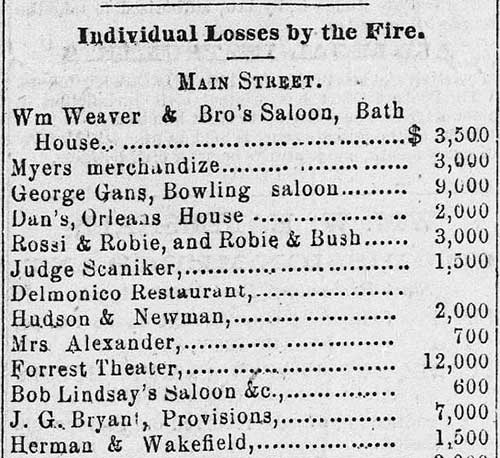
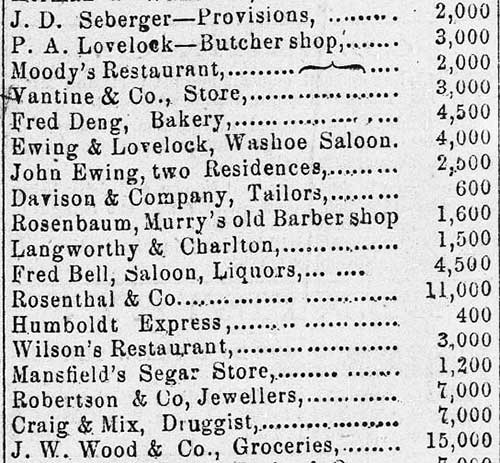
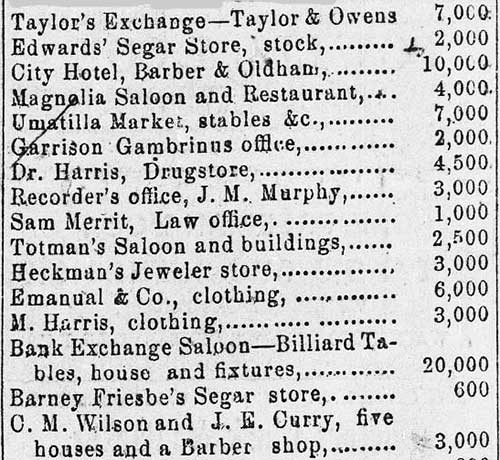
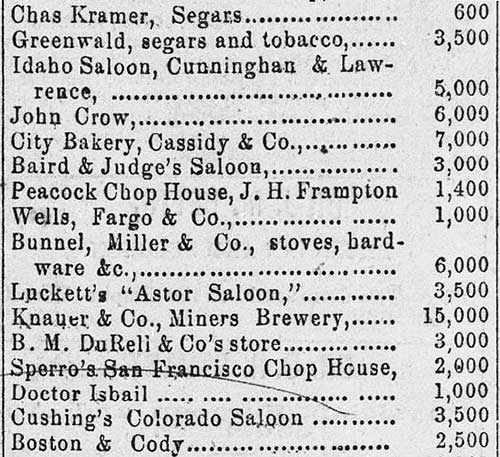
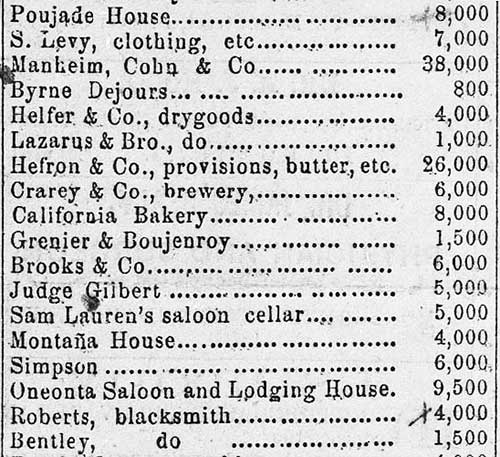
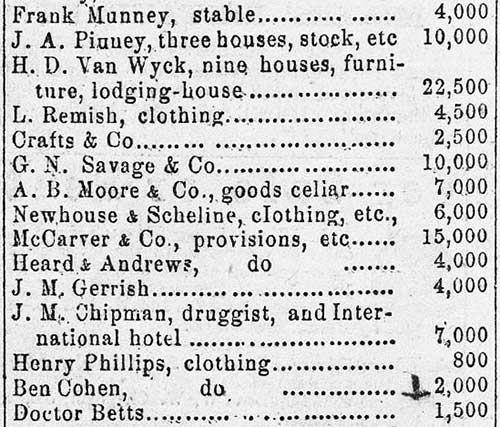
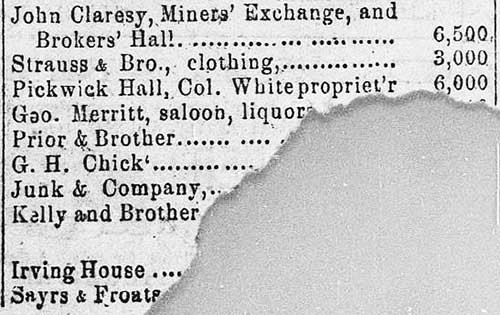
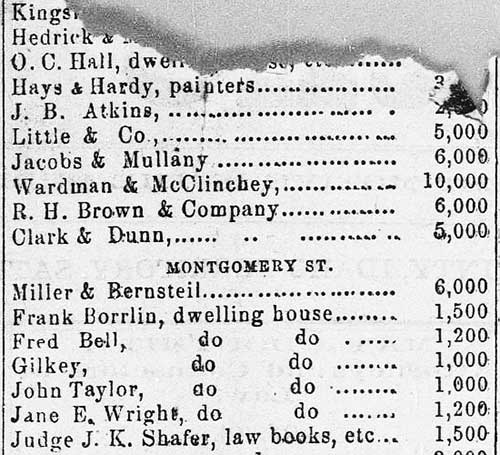
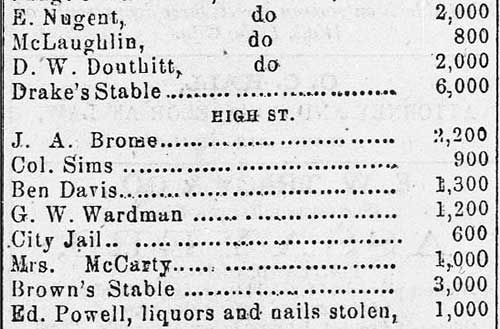
It is estimated by competent judges, that $50,000 worth of goods was packed off during the conflagration.
The Sheriff And The Thieves
The town was probably set on fire to afford an opportunity for plunder, and it was used. Everything was snatched up and carried away the moment it was left by its owner. In ever direction men were packing away flour, liquors, cases of goods, bedding &c. The Sheriff appointed a large number of special deputies who patrolled the whole town during the night, making several arrests, and receiving some property. But in the confusion of the hour it was impossible to distinguish in all cases between those rightfully or wrongfully in possession of articles. Every one on that occasion claimed to be acting for the benefit of others, and the interest of parties in possession of goods was ascertained with difficulty. Some parties were disposed to censure the Sheriff and deputies for the thefts, but we think without cause. The whole corps of officials were at work all night and did everything that men could to preserve order. Since the fire, means have been taken by Mr. Dowen which have resulted in the return of a considerable amount of the lost goods, and the discovery of quantities of concealed merchandise. The officers have done their duty faithfully and will yet bring some of the guilty to a merited punishment for their crimes.
What Was Left
Not a single hotel was left in Idaho City on the morning after the fire. Several extempore tables were put up in the gulches, and many were fed at private houses. The hotels on the Bar were thronged. But one store – Ben. Woods – was left. McClintock & Stewart’s livery stable is alone in that line. Among the public buildings and offices the Catholic Church, Methodist Church, Jenny Lind Theater, and Idaho World office alone were preserved. Father Poulin opened the Church for the Hospital inmates – the Theater and newspaper office were crowded with families and the homeless generally.
Luckett’s Saloon, and Taylor’s Exchange will be open again to-night on the old lots. They are moving new buildings for that purpose.
The Sheriff’s office is one down below Powell & Coe’s with Mr. Pinney who has opened the Postoffice there. Wells, Fargo & Co. are with Powell. The Recorder at Allison’s residence.
source: The Idaho World. (Idaho City, Idaho Territory), 20 May 1865.
Chronicling America: Historic American Newspapers. Lib. of Congress.
— —
The Idaho World. May 20, 1865, Page 3
The Dram-Ah
As usual at fires, there were a good many queer and laughable antics performed by different individuals. One of the unfortunate merchants started up East Hill with a box of soap, when a sack of flour would have been carried as well and come in much better play next morning. Others again found themselves up the hill with a box of candles, (as if the scene needed more “light on the subject,”) leaving others things really necessary behind. But the sight presented by some of the theatricals engaged at the Forrest, was the most amusing, perhaps. First on the programme for that evening’s performance was the play of “Romeo and Juliet.” Romeo got demoralized by the cry of fire about the time he was proceeding to prepare Tybalt for the tomb of the Capulets, and broke for the Poujade house like a blue streak, keeping a tight hold on his scepter and shield, and receiving more true applause, notwithstanding the excitement, than in any previous act of his life. That Tybalt was not killed, we are satisfied beyond a doubt, having seen with our own eyes, he and Romero (next morning about nine o’clock) standing over an old cooking-stove back of where the Forrest stood, sipping something out of two oyster-cans, and partaking of such other refreshments as were to be had. The “fiery Tybalt” seemed to have had all the “snap” taken out of him by the conflagration, and the impulsive Romeo ditto. “It being necessary to kill Mercutio in the first act,” &c. – (see comments on the play in Shakespeare) – we have no doubts as to his being defunct; that he is in the “tomb of the Capulets,” or even in the Buena Vista Cemetery, we have many scruples – he most probably went “up the flume” located on Bear Run. The last seen of Friar Lawrence he “had other fish to fry,” hastily disposing of any further trouble on Juliet’s account. It is the supposition that “the county Paris” petered out after the style of Mercutio. Of course Juliet had not yet arrived at her part of the role somewhat resembling that of Villikins and his Dianah, consequently she escaped the “cup of cold pizen,” going perhaps in search of Romeo, who had demanded some additional “satisfaction” in a former scene. The Capulets and Montagues were still “at the outs” up to the time when the fire broke out, but the sudden and extraordinary heat must have put them in “the melting mood,” for they seemed to harmonize next morning – on the grub question, at least, like the balance of us, – a point undecided yet between cats and dogs. As to the fate of Benvolio, Balthazar, the Apothecary, “alligators stuffed and other skins of ill-shaped fishes,” we have not sufficient data for form conclusions. The orchestra had no particular desire to imitate Nero on this occasion – to fiddle while Bannock burned – that they freely participated in the pleasures of the common stampede; the last seen of the leader, he had on a fireman’s shirt and was making over East Hill as if he had just busted a – cat-gut, of course.
(ibid. page 3)
— —
The Idaho World. May 20, 1865, Page 4
We Still Live
“Amid the rush of mater and the crush of worlds” the Idaho World still survives, sorrowfully looking from the heights of East Hill upon the wide and dreary drift of ashes we formerly know as Idaho City. The wall of fire swept away the last plank to the west of us, creeping high up on Wall street. Nothing but the most strenuous exertions saved the office from the common destruction. By keeping the building partially covered with wet blankets, and thoroughly saturated with water, it escaped. To the many friends whose assistance was freely extended us, we return our sincere thanks.
The Poujade House will be up again better and larger than ever within three weeks, the lumber having been secured before the old building fell to the ground.
The Records of the Recorder and Sheriff’s offices were mostly preserved from the fire. The Masonic Lodge Records were only partially saved. All letters &c. were saved from the Postoffice.
The Jenny Lind Theater will be opened again to-night and on Sunday night by Mr. Potter. This (Saturday) evening “Fazio, or The Italian Wife,” will be presented. The theater being open, the outside population will find a place of amusement instead of their usual haunts, and others a relief from painful recollections.
(ibid. page 4)
—-
The Idaho World. May 27, 1865, Page 1
[Local News]
D. W. Douthitt [?], Esq., informs us that some person took from the flat, some little distance north of the Methodist Church, a wool mattress, with two pillows and four and a half pairs of blankets. These articles were valuable to him, and were removed to a point entirely out of reach of the fire, which was the case in a large number of instances. We are authorized to state that if this bedding is returned, no further steps will be taken – if not a search will be made, and if any person is found in possession of the same with a guilty intention, he or they will be prosecuted to the full extent of the law. The articles can be fully identified.
source: The Idaho World. (Idaho City, Idaho Territory), 27 May 1865.
Chronicling America: Historic American Newspapers. Lib. of Congress.
— — — — — — — — — —
The Idaho World. May 27, 1865, Page 2
[City News]
Attempts to fire the town were made on four occasions during the week previous to this conflagration. The first of these was at the upper end of town, a building near Bear Run; the second attempt was made of Manheim, Cohn & Co’s cellar, into which an instrument was inserved of the nature of a rocket, which exploding would have scattered fire in all directions. The third was on the saloon of Gans & Bro. In the alley adjoining this building a collection of inflammable matter, thoroughly sutured with coal oil and turpentine, had been placed. It was discovered by the dog attached to the house before effecting any damage. The persistency evinced by these diabolical attempts display spirit of a fiend rather than of men, and confirm the impression that the fire which finally destroyed the town was the work of hate and love of plunder, and not of accident.
The Total
The list of losses by the fire as published in detail in another portion of this paper, figures up a total of $883,300.00. To this may be added the amount destroyed belonging to persons whose name we have been unable to procure, which will make the total loss about one million of dollars.
Stolen Goods
The Sheriff and deputies have been very busily employed during the past week ferreting out stolen property. A large amount has been recovered and returned to the owners. A portion still remains at the Jail in custody of the Sheriff. We understand a committee of merchants and others who have lost goods of that description, will make an examination of the property on hand and endeavor to ascertain the real owners. These articles were found hidden away in every conceivable manner – buried in the earth, secreted behind rocks, hidden in the ditches and creeks, and stowed away in cellars. The town was literally sacked as well as burned, property in many instances being carried off which could be of no value to any one but the owner.
While we are on this subject we may revert to another matter which created a great deal of unnecessary talk shortly after the fire. There appeared to be a disposition shown among some of our citizens to create a feeling between the merchants and others in town, and miners. Nothing could be more absurd. There was no more issue between merchants and miners, than between carpenters and tailors, or attorneys and blacksmiths. Many felt very sore over their losses, after they had saved their goods from the burning houses, and probably used language in the excitement of the moment neither just nor appropriate. This created feelings equally as unjust upon the other side. Nearly every business man here has been a practical miner at some period of his life, and every one is indirectly a miner yet; all being equally interested in the prosperity of that business upon which every branch of business depends. It was not against that any feelings was created because of the refusal of some to submit to a search of their dwellings. The language of Judge Scaniker, Dr. Harris, and others, at the meetings held in the streets on the morning after the fire referred to the thieves and outlaws who are not miners, but who are passing themselves off as such; men who have decamped from adjoining States and Territories to save their necks from the gallows, and have assumed the outside appearance of miners, this better to preserve their incognito, and continue their robberies with safety. A great number of this class of men are known to be here – are known to have participated in plundering the people in the moment of their sorest distress – and no disguise whether as merchants, miners or other garb, ought to shield them from discovery and punishment. We do not believe that the real bona-fied miners in this neighborhood had anything more to do with these thefts than any other class of business men in this community. No character or business should be made indiscriminately responsible for the acts of individuals; and in this the mining community were right in objecting to the careless use made of the name by some, who really intended it to apply to pretended miners, and not to the community generally.
Died
At the County Hospital, in Idaho City, I. T., on the 24th of May , 1865, A. R. Sawyer, aged 22. Deceased was from Wisconsin, and papers there will please copy.
source: The Idaho World. (Idaho City, Idaho Territory), 27 May 1865.
Chronicling America: Historic American Newspapers. Lib. of Congress.
— —
The Idaho World. May 27, 1865, Page 3
City News
The Recorder and Auditor’s office is removed to Main street, opposite the Umatilla Market.
The Bank Exchange – Campbell & Splan will be opened again to-night in a commodious building on the old stand.
The office of Mr. Henly, District Clerk, is one door above Dryde’s stable; the Sheriff at Mr. Gaby’s; Justice McGownd at the World office.
The Board of Brokers have been left out in the cold by the conflagration, and unfortunately will have to close their operations until another building can be obtained. They had fitted up in style previous to the fire, but all went by the board.
Some of the property owners on the upper end of Main street justly became indignant at the idea of Chinamen locating on the principal thoroughfare of the town. Several China wash-houses were contemplated, but on the remonstrance of some of the residents the project was abandoned.
Ned Edwards has arisen in the “Phoenix” from the ashes of the “Express.” He is determined not to be smoked out by anything but his own tobacco. Billy Marshall looks pretty desperate for a peaceable man, but he still stands guard waiting for a new stock.
Mr. Jas. Pinney, acting Postmaster at Idaho city, succeeded in saving all of the mail matter and government property from the conflagration. In expending his labor in that direction however, he lost most of his large stock of books, stationery, &c., contained in the bookstore. He has started again next door to Powell & Coe, and will soon have another stock on hand.
Special Notice
On the night of the fire a roll of bedding, consisting of three pairs of blankets (two gray and one red colored) and a large gray shawl, was carried off from near this office. Inside of the roll were several revolvers. The package was easily recognized by the shawl, &c., and the parties having the same may save trouble by returning the same to this office, or placing it in the hands of the Sheriff.
The Town
Main and Wall streets are rapidly assuming the appearance of life again. Houses are in course of construction in line along Main and Wall streets, and some other portions of the place are becoming inhabitable. Lumber is selling for $60 [?] per thousand, and is consumed on buildings as rapidly as it comes from the saw mills. The town is very dirty and in confusion but with the laying down of the side walks, and clearing away of material, we shall soon behold a new, if not as large a town as before.
A Fair Offer
C. Clane of the furniture store on Main street, is highly indignant over the want of respect shown by the plundering thieves on the occasion of the fire. Among the articles stolen were some coffin trimmings, handles, &c. Clane says if the villain will return the articles he will contract to make a coffin for the scoundrel free of expense. From Clane’s manner while requesting us to state this offer, we have a suspicion that he would also gladly assist in laying him out in it. Return the articles and get your coffin. You will never have another opportunity of dying so cheap.
For Larceny
A number of the parties arrested and brought before Judge Shepherd, charged with being in possession of stolen goods taken during the fire, have been found guilty and been sentenced to fines or imprisonment. Among them are the following:
John Deeghan, sentenced one hundred days in Co. Jail, or $200 fine; paid.
Wm. Lucas, fine $57; paid.
Daniel Sullivan, fine $128; paid.
John Bagley, fine $64.
George Scott, fine $63.
Charges were preferred against Patrick Burs, H. McCauley, P. Gibson, John Couklin, and Eugene Hogsden, but were not sustained by the evidence and the cases were dismissed.
Link to “List of Losses Incurred by the Fire
(ibid. page 3)
— — — — — — — — — —
The Idaho World. June 03, 1865, Page 2
[Local News]
The action of the Placerville authorities in promptly offering to the citizens of this place the free use of the buildings in that city, immediately after the fire, was a very liberal act, for which Placerville is entitled to the thanks of this community. It is one of those cases, however, which we hope will never require a reciprocation from Idaho City.
Born
At Idaho City, May 30th, 1865, the wife of James Wright of a son.
At Buena Vista Bar, May 31st, the wife of H. G. Millet of a son.
Died
At the County Hospital, of typhoid pneumonia, John Faust, aged twenty-two. Deceased was a native of Pennsylvania. Allegheny City Penn. papers please copy.
source: The Idaho World. (Idaho City, Idaho Territory), 03 June 1865.
Chronicling America: Historic American Newspapers. Lib. of Congress.
— —
The Idaho World. June 03, 1865, Page 3
City News
East Hill is becoming a favorite building spot since the fire. Several lots have been located lately, and in a few weeks a fine row of private residences will adorn the Eastern horizon, hanging the town in a gilded frame.
New City Hotel
Mr. L. H. Barber requests us to state that the City Hotel will be resurrected and running in better style than ever within thirty days. This is enterprise for you! The building will be one hundred feet in length by twenty-four in width. We are happy to make this statement.
Improvement
Among the many features of the Phoenix-like town of Idaho, we notice that Langworthy & Charlton have fitted up their new office in a style which we think will hardly be surpassed by any other in the place. We like their style of energy, and hope they may meet with the success they deserve.
Messrs. Gane and Bro. will soon have another building on the lot formerly occupied by their saloon on Main street, larger than the other destroyed by the fire. One of the firm has gone below for a new stock. They are prompt, enterprising business men, whom the town is fortunate in numbering among its citizens.
A Gale
The Spring winds let themselves loose last Saturday afternoon in a series of gusts which thoroughly disgusted everybody. For an hour the air was filled with dust, houses in several cases following the dust – tents were flattened out and trees blown down. Toward sundown the winds subsided.
Persons wanting a splendid “Iron Range” are referred to Chick & Co’s who have one for sale. This establishment has arisen out of the ashes of the conflagration, bright as the metals in which they deal. Their shops contains a full assortment of everything manufactured from tin, copper, zinc or iron. Jobbing of every kind is also attended to. See advertisement for location.
A Mr. Pinner arrived here with his family on the night of the fire, and has been endeavoring to find work since, but has not been very successful. He owns a very fine sewing machine, capable of doing heavy work, which he would like to find use for. Persons desiring work done will be assisting an industrious family “under adverse circumstances” by leaving their orders with Ben Cohen on Main street.
Should Be Remembered
The preservation of the Jenny Lind Theater was the means of saving the whole upper end of town during the fire. That theater owes its existence in a great measure to the boldness and untiring energy of Mr. P. A. Deutch, one of the employees at the theater, who for a long time fought the fire alone in the face of heat almost unendurable. He was formerly connected with the fire department in New Orleans, and his professional skill found ample scope in this struggle. Dr. Deutch was aided by several of the Troupe at the Theater, including Messrs. Waldron, Pardey, Townsend and Graham.
The Hospital Inmates
There is now seventeen persons on the hospital list. They occupy the Catholic church for the present. Eight of them are confined to their beds. Much of the bedding and blankets belonging to the inmates were stolen during the fire. If anything can equal this act of atrocity, we have not yet heard of it. A new building for hospital purposes is contemplated, which if erected will probably be put up on the hill east of town.
Man About Town
Taking it for granted from the one of the last “world” that “crazy Quartz” has been laid on the shelf it seems an appropriate time to comply with your request in way of giving some local items for the benefit of those patrons of the paper who cannot do without such things.
To commence with then, allow me to remind all honest persons that on the night of the 18th ult. the city of Idaho was burned down and pillaged by the sneaking thieves or their friends, who have always complained of the unfairness and penuriousness of the traders and merchants, who have been trusted and honored by the citizens of this town until almost beyond endurance, and by way of self preservation some of us were compelled to make our contracts a little more secure; and now in return for all the favors we have extended to these people they come and burn the town for the sake of stealing a few thousand dollars worth of goods.
There are only a few of the merchants or traders in Idaho who have ever made a dollar by his business; and of the mechanics, hotel keepers, &c., certainly none of them have ever made any more than industrious and energetic spirits deserve. In fact, the people of Idaho, are rather poorly encouraged all around for their activity in coming to a country like this to build up a town, the necessity of which is acknowledged in all mining communities, and expecting thereby to be allowed an even chance for reward for their labor and capital.
Now as soon as another fire breaks out in town let every person who carries his goods outside, station some one over them with a double barreled shot-gun to guard the heap; let us recollect that whenever we leave them for a moment alone some thief who has been watching the opportunity, is ready to pounce upon a bundle and make off with it to a secure “hole in the ground” where he hopes to feast for a while on his ill-gained booty without molestation and without work, and perhaps until such time as he can make another raise of a similar character. If we shall faithfully pursue this course most of the goods saved from the fire can be retained in our possession, and I think it much better policy to let them burn than to pack them out to a dark sand-bank and leave them to be carried off by thieves.
The loss of the Masonic Hall, and records thereof, was severely felt by the order which was in a flourishing condition, and the members will probably not get thoroughly at work again for several weeks, in consequence. The charter was saved, however, ane the delay will not therefore be very long.
The Board of Brokers were handled without gloves,” and left somewhat in debt; and in just what style they now propose to rebuild their fallen structure I have not been informed, but that they will do it soon in some manner there is no serious doubt.
Since the fire our citizens have been very actively engaged in building, and Main street is nearly filled again by the former occupants. Toward the lower end of town, some portion of which escaped the fire, property and lots have advanced in value about one hundred per cent. Wall street has lost some of its prestige and the glory of Commercial and Wallula streets is just opening out. “Its an ill wind that blows nobody good.”
Mr. Poujade is building a hotel on the corner of Main and Commercial streets much more extensive than is old one was, and as he has secured the lot clear though to Montgomery street he probably concludes to provide public accommodations for all who may wish to patronize his house. Several new establishments for business, etc., are springing up on Wallula and Commercial streets and in fact the whole of the burnt district in every quarter is being rebuilt as if by magic, and in a week or two Idaho will have risen Phoenix like from its ashes, and will be “gayer,” than ever.
Among the most enterprising firms to recover in a hurry have been Messrs. Campbell & Spahn, Joseph Luckett, Geo G. Merritt, Baird & Judge, and all the heaviest dealers in dry-goods beside. In fact every body who was burned out seems to have exhibited the old California spirit of energy in building up again.
I am told that a well appointed saddle train for the accommodation of passengers will be placed on the route to Rocky Bar direct, in a very few days, by Greathouse & Kelly who are running a splendid double daily line of four-horse stages to Placerville. For the manner in which they have kept up communication through the winter they are certainly entitled to the fullest patronage and confidence of a grateful public and they will get it. As soon as the Poujade House is ready for business we hope to see them establish head-quarters in good style.
Cornish & Co. are running tri-weekly to Boise City and making excellent time.
Also, arrived during the week Capt. John Mullin’s coaches, which we believe are to be placed on the route between Idaho city and Chico, California.
Mr. Potter’s dramatic troupe has taken possession of Placerville this week. Hope to see them here again very soon. We have not heard anything for several days regarding the building of a new theatre. Perhaps the idea has been blown away.
The weather is warm and decidedly good. The nights are comfortable; I’m off to my pleasant dreams.
Yours truly, Indication.
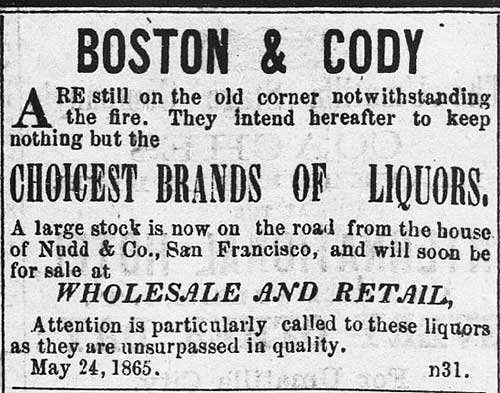
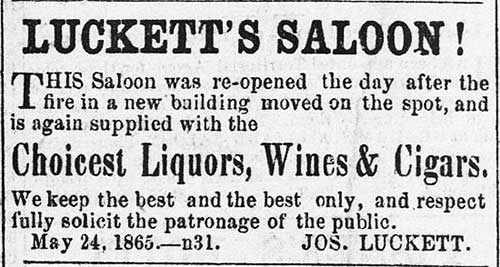
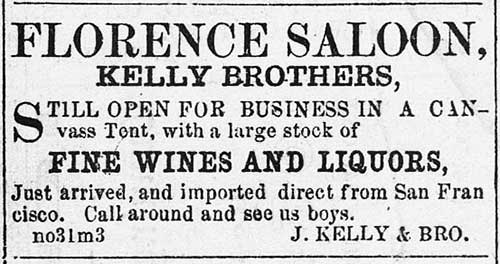
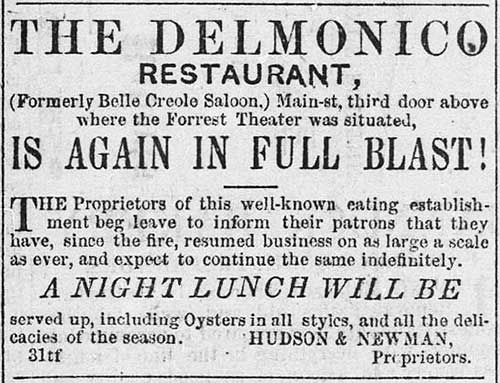
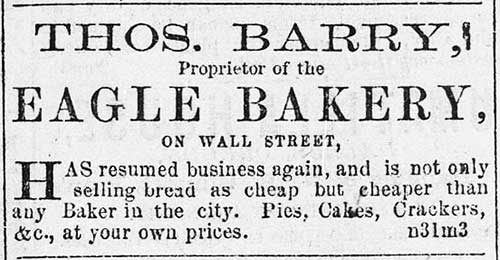
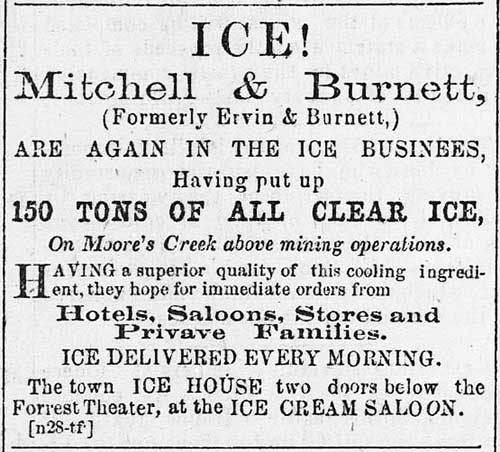
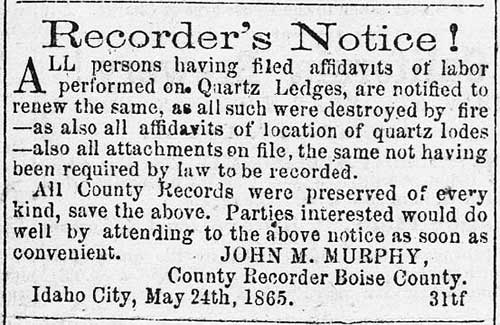
(ibid. page 3)
— — — — — — — — — —
Photos
St. Joseph’s Roman Catholic Church, High & Wallula Streets, Idaho City, Boise County, ID
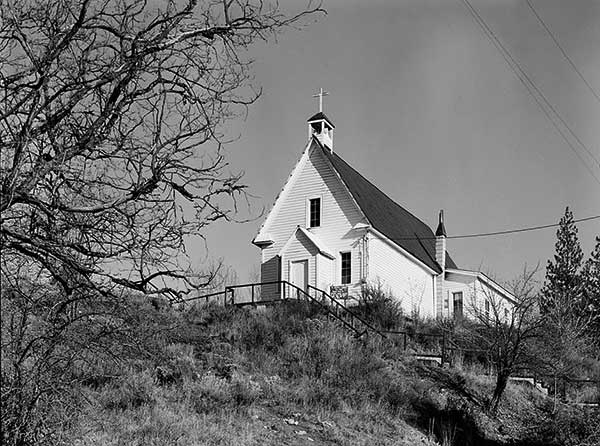 after 1933
after 1933
The first Catholic church in the Boise Basin and one of the oldest in the state of Idaho, St. Joseph’s was dedicated on November 15, 1863, originally to serve the religious needs of the Euro-american Catholics. After avoiding destruction in Idaho City’s first major fire of May 18, 1865, it burned to the ground on May 17, 1867. It was rebuilt the following autumn.
source: Library of Congress, No known restrictions on image
— — — — — — — — — —
War Eagle Hotel, Idaho City, Idaho
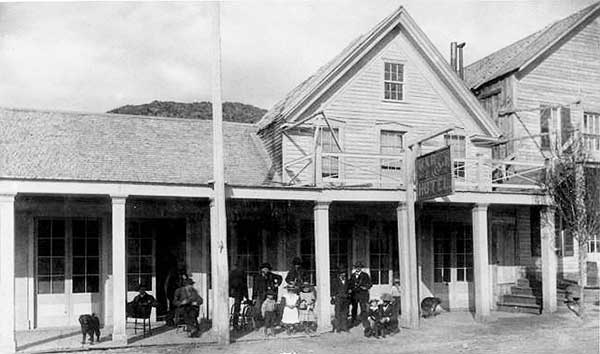 Men and children viewed standing on the sidewalk in front of the War Eagle Hotel in Silver City, Idaho.
Men and children viewed standing on the sidewalk in front of the War Eagle Hotel in Silver City, Idaho.
source: Idaho State Historical Society (undated) Copyright Undetermined
————–
Further Reading Offsite
Link to Boise News. (Bannock City, I.T. [Idaho City, Idaho]) 1863-1864 Library of Congress Chronicling America online collection.
Link to The Idaho World. (Idaho City, Idaho Territory) 1864-1918 Library of Congress Chronicling America online collection.
Link to Idaho Semi-Weekly World. (Idaho City, Boise County, Idaho Territory) 1867-1868 Library of Congress Chronicling America online collection.
Link to Idaho Tri-Weekly World. (Idaho City, Idaho) 1875-1875 Library of Congress Chronicling America online collection.
Link to Idaho Semi-Weekly World. (Idaho City, Idaho Territory) 1875-1908 Library of Congress Chronicling America online collection.
Link to “Gold Camps & Silver Cities” by Merle W. Wells, 1983 (Free e-Book 112 megs)
Link to Legends of America, Kathy Weiser-Alexander
Link to Western Mining History, Idaho City
Link to Boise County
—————-
Further Reading
Link to Idaho City (Part 1)
Link to Idaho City (Part 2)
Link to Idaho City (Part 3) Bannock City
Link to Idaho History Index Page
—————-


